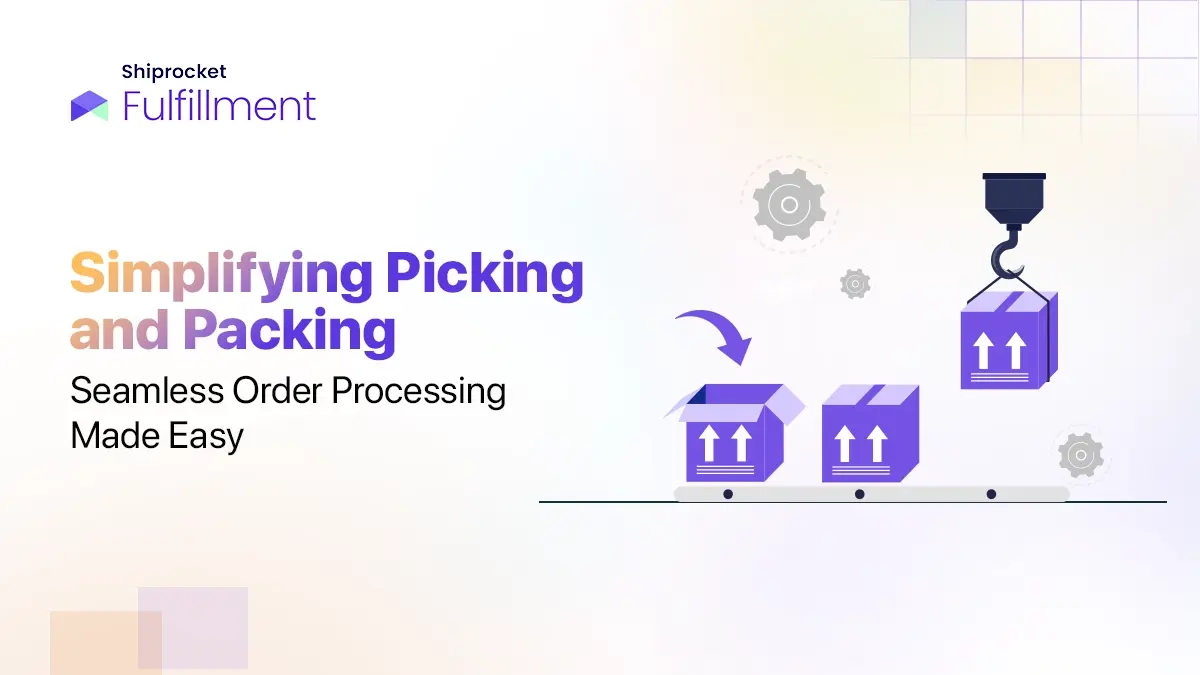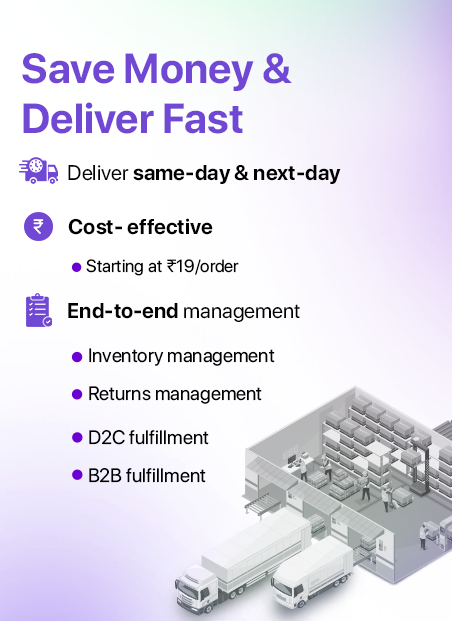Warehouses are huge spaces allowing businesses to store, transport, and distribute goods from a centralised location. All businesses cannot have warehouses, and many tend to lease or rent the same from other parties or use third-party partners to manage their fulfillment requirements. Selection of warehousing partners is important as they enable you to track and manage inventory, reduce transportation costs, reduce staffing needs, and increase your flexibility to either increase or decrease stock as per business requirements.
The growth of the eCommerce and retail sector has generated a demand for warehouses in India. By 2027, the warehousing market in India is expected to reach INR 2,872.10 billion. Selecting a warehouse partner is not easy, but with the help of this article, we can guide you on the 7 factors to consider when selecting your warehouse partner.

Top 7 Factors To Consider When Selecting Your Warehouse Partner
To find the best warehouse partner for your business requirements, you can consider the following factors:
1. Layout and Flow Optimisation
The warehouse layout should be designed to maximise space and streamline operations. A good warehouse layout design should consider workflow efficiency, storage space, floor space, and easy access to products and equipment. Warehouses that have implemented technology like collaborative mobile robots would help to improve productivity and optimise resources.
A few methods to improve layout and flow optimisation are:
- Reduce travel time by storing the most picked items in locations that are easily accessible
- Sort shipment according to the product or category type
- The quality control area should be set up as close as possible to the packaging area
- Optimise aisle width
- Implement proper signage and labels to facilitate navigation
- Standardise processes
Choose a warehouse partner who can provide or implement these methods to improve your warehousing experience with them.
2. Skilled Workers
Warehouse workers are the pillars behind the successful running of a warehouse. A warehouse has different roles and responsibilities, and skilled workers are required to handle these job profiles. Skilled workers require soft and hard skills to work efficiently in the warehouse. Soft skills like communication, teamwork, and discipline are required for daily interaction and functioning with other workers and customers. Hard skills like knowledge of warehouse management, inventory management, delivery management, and safety management would help maintain the warehouse properly.
Every product is different concerning its storage and packaging requirements. Workers employed for warehouse management should understand the type of product stored and its storage requirements. Warehouses also require skilled workers well-versed in software and automated technologies to handle material or warehouse management systems.
The best layout or design becomes immaterial if no skilled workers can perform the warehouse’s day-to-day activities. A warehouse partner should also have capable workers within their payroll to provide you with the best service.
3. Licenses and Permits
Any person starting or carrying on a warehousing business must be registered with Warehousing Development and Regulatory Authority (WDRA) and procure a warehouse licence. If proper licenses and permits are not obtained, one can be imprisoned, fined, or both. So, it is safer to first get all papers in order and checked before partnering with a warehouse partner.
Building new rack systems in the warehouse requires proper permits like building and fire permits from the concerned authorities. Permits differ with respect to location, state, and country.
4. Location and Infrastructure Network
The location of the warehouse facility makes a great difference in fulfillment timelines and the cost of operations. An easily accessible warehouse near major highways, shipping hubs, and customer base would help reduce last-mile delivery costs by maximising delivery speed and efficiency.
Nothing better than partnering with a warehouse partner who can customise their warehouse as per your requirements without compromising on the quality of service and performance. This would be beneficial to both parties as this can lead to maintaining long-term operations with each other.
The infrastructure network in the warehouse should be equipped with the correct equipment and technology for efficient distribution. This will help you to get your products quickly and efficiently to the customer.
5. Material Management Systems
Every material is different and requires proper skillsets and tools to handle the same. The right warehouse partner should have good material handling capabilities best suited for your company’s needs.
Also, the warehouse should be able to handle the volume of your goods and appropriately scale its operations to support the same. Ideally, the warehouse partner should provide backloading and front-loading services, making it easier for you to transport your products in and out of the facility.
6. Adequate and Flexible Storage Capacity
Storage capacity requirements for a business can vary for various reasons. Suppose your business is dependent on seasons for the sale of products. In that case, your warehouse partner must be able to handle more goods during the peak season and less during the non-peak season. Partnering with a warehouse that can adjust its operations based on your company’s needs is a valuable asset. Flexibility in scaling their operations can ensure that your goods are stored safely and efficiently while avoiding unnecessary costs.
7. Compliance with Industry Norms and Regulations
Warehouse compliance includes safety procedures and adherence to industry compliance regulations. Warehouse safety procedures include material handling and storage for hazardous materials, food, or high-value inventory.
A few general warehouse rules include caution when using lifting equipment, storing materials safely, maintaining fire safety, etc. Proper insurance coverage for the warehouse is also an industry norm that needs to be followed. One must always partner with a warehouse partner who prioritises following safety norms and regulations.
8. Technology-Driven Services
An ideal warehousing partner should rely on the latest technology and tools to offer a full range of modern warehousing services. They should be able to provide inventory levels on request or via dashboards. If you need more than storage facilities, it is important that the warehouse partner has automated services. This way, you can receive reports and status updates regularly and have high visibility of stocks.
9. Seasonal Requirements
When you short-list warehousing partners, you should consider the kind of products you will be handling throughout the year. If you are offering seasonal products like winter wear, then public warehouses will be the ideal partner for your business. However, when you offer products that have varying demands, then contract warehouses are ideal.
10. Charges
It is critical to consider the pricing of warehousing partners to see if they fit into your budget. The charge for the warehouse facility depends on various factors like consignment quantity, packaging, inserts, etc. So, choosing a partner according to your requirements and falling within your budget is essential.
Shiprocket’s Latest Solution as Warehouse Partner
Shiprocket is India’s no. 1 eCommerce logistics solution provider. It provides a simplified eCommerce fulfillment, warehousing, and logistics solution. Partnering with Shiprocket is easy as it does not require additional warehouse investment, follows a quick onboarding process with minimal paperwork, and can accommodate a surge in order volume. It is possible to deliver your product to any corner of the country as Shiprocket provides 45+ warehouses across India to fulfill your order faster.
Conclusion
Choosing the right warehouse partner can be a game-changer for your business. A dependable partner will be responsible for providing cost-effective transportation routes and efficient inventory management, which can significantly streamline your product distribution network, save valuable time, and reduce costs. Therefore, it’s crucial to carefully evaluate your business needs and collaborate with a warehouse partner that can align with your objectives and help you achieve your business goals.
Frequently Asked Questions(FAQs)
WDRA stands for the Warehousing Development and Regulatory Authority and was established by the Indian Government on 26th November 2010. WDRA ensures the implementation of the provisions of the Warehousing (Development and Regulation) Act, 2007 in India.
Proper security measures like security personnel, fire alarms, security cameras, fire sprinkler systems, etc., should be in place to reduce the chances of theft and damage to goods stored in the warehouse.
Warehouse optimisation is important as it increases your storage space, thus increasing overall capacity and the flow of operations. An organised warehouse makes it easier to pick products, thus reducing the time taken to complete orders.





